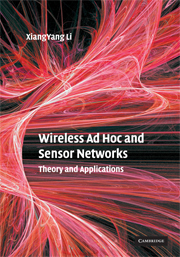Book contents
- Frontmatter
- Contents
- Preface
- Acknowledgments
- Abbreviations
- Part I Introduction
- Part II Wireless MACs
- Part III Topology Control and Clustering
- Part IV Wireless Network Routing Protocols
- 13 Energy-Efficient Unicast Routing
- 14 Energy-Efficient Broadcast/Multicast Routing
- 15 Routing with Selfish Terminals
- 16 Joint Routing, Channel Assignment, and Link Scheduling
- Part V Other Issues
- Bibliography
- Index
15 - Routing with Selfish Terminals
from Part IV - Wireless Network Routing Protocols
Published online by Cambridge University Press: 06 July 2010
- Frontmatter
- Contents
- Preface
- Acknowledgments
- Abbreviations
- Part I Introduction
- Part II Wireless MACs
- Part III Topology Control and Clustering
- Part IV Wireless Network Routing Protocols
- 13 Energy-Efficient Unicast Routing
- 14 Energy-Efficient Broadcast/Multicast Routing
- 15 Routing with Selfish Terminals
- 16 Joint Routing, Channel Assignment, and Link Scheduling
- Part V Other Issues
- Bibliography
- Index
Summary
Introduction
When designing routing protocols, it is often implicitly assumed that each participant (users or routers) will faithfully follow the prescribed protocols without any deviation–except, perhaps, for a few faulty or malicious ones. For example, in wireless ad hoc networks, it is commonly assumed that each terminal contributes its own resources to forward the data for other terminals to serve the common good and benefits from resources contributed by other terminals to route its packets in return. However, the critical observation that individual users who own these wireless devices are generally selfish, aiming to maximize their own benefit instead of contributing to the system, may severely undermine the expected performances of the wireless networks. The limitations of energy supply, memory, and computing resources of these wireless devices raise concerns about the traditional assumption about terminals' conforming to protocols. Sometimes, wireless devices owned by individual users may prefer not to participate in the routing in order to save its energy and resources. Therefore, if all users are selfish, providing incentives is a natural and common way to encourage contribution and thus maintain the robustness and availability of networking systems. The question turns to how to design the proper incentives.
- Type
- Chapter
- Information
- Wireless Ad Hoc and Sensor NetworksTheory and Applications, pp. 402 - 439Publisher: Cambridge University PressPrint publication year: 2008



